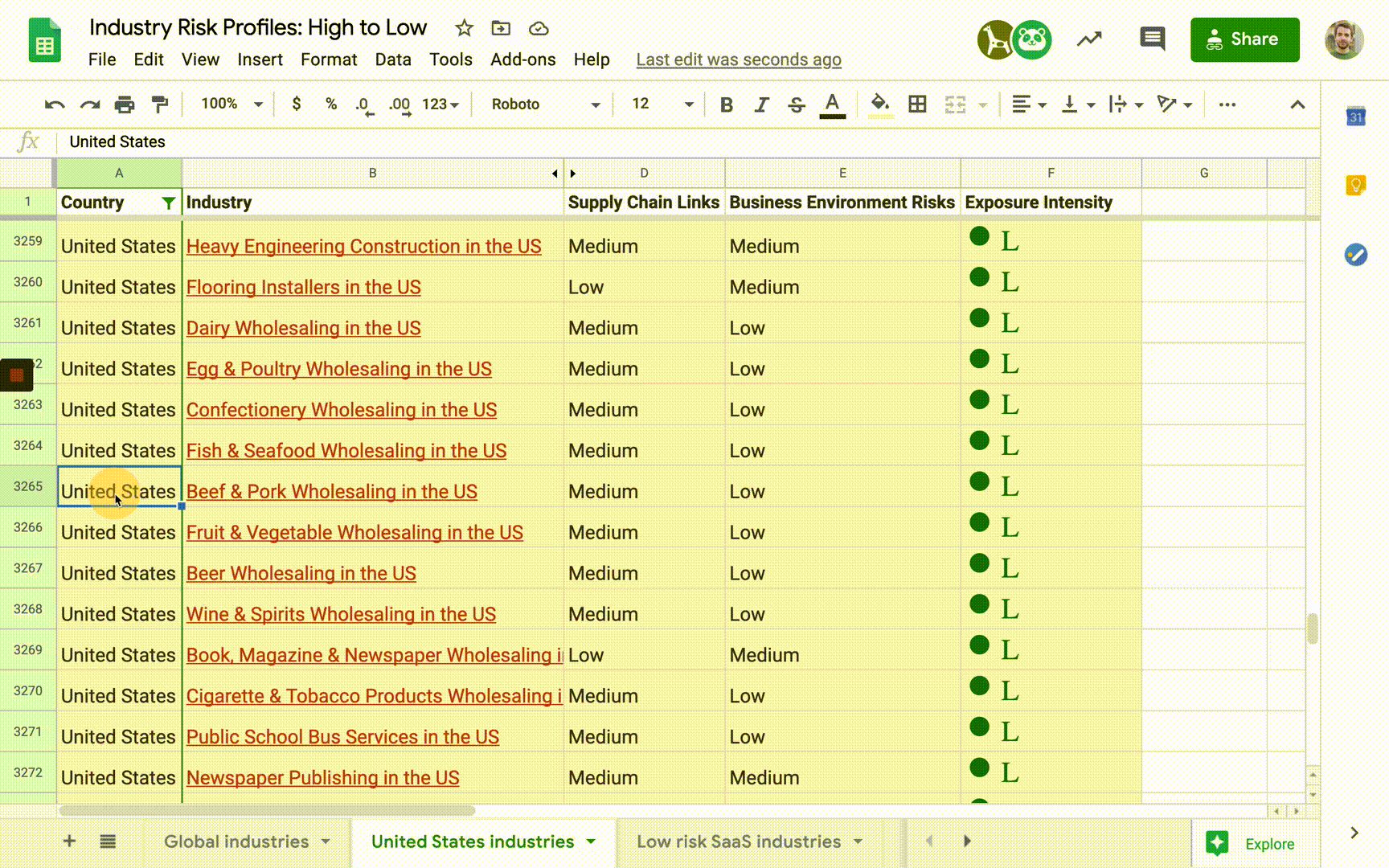Done right, there are real ways for sales and lead gen teams to convert the current crisis into a prudential opportunity.
The first step: Focusing your sales and lead generation efforts on known recession-resistant industries.
How? Glad you asked.
Focus on the Right Markets
Even in non-COVID times, companies should be periodically evaluating whether their existing ICP is the right one, whether their target personas are in the right industry, or whether they need to be changed or expanded altogether.
There’s no one-stop-shop for easily deciding which companies to target, but there are plenty of resources out there that can help you make inferences and look at which companies are more likely to be doing well. From here you can prioritize which companies and industries to target and which ones aren’t worth your efforts.
High and Low-risk Markets

Some industries in the US are clear no-go sectors that shouldn’t be targeted right now. Manufacturing and automobile industries are generally struggling, as are retail businesses. These industries should be avoided if possible.
Conversely, food wholesaling industries are thriving and perhaps unsurprisingly, so is the wine and spirits industry. Insurance companies are also fairing better than most in the face of COVID-19 as a recession-resistant industry. As are digital sectors including point of sale software developers and online legal services are fairing better than most industries. Dig into these recession-proof industries for your sales and lead generation teams.
Targeting tech is recommended, but look closely at the tech, media, and telecom sectors and you’ll see that there are some victims of COVID-19 there, too. IT services have taken the hardest hit, and consumer electronics are worst affected. If your startup targets these verticals, it’s worth looking at how you can work cross-market to reduce your risk.
SaaS Industries

Source: G2Crowd
Unsurprisingly, a few online industries are thriving in our current locked-down reality, so they’re definitely worth your consideration. Some slices of the industry are fairing especially well withstanding the crisis, from online learning solutions to VPN’s.
As we all know by now, audio and video conferencing’s rise has been meteoric since many of us are now working and learning from home. Webinar and conference platforms are doing well, too. Telemedicine is another industry to keep your eye on, as is collaborative whiteboard technology and virtual classrooms.
Follow the Supply Chain and the Customer Base
In the words of The Wire’s inimitable Lester Freamon: Follow the money.
Look more broadly than the recession-resistant industries themselves.
You can also sell to the companies that in turn sell into the businesses that are doing well in the face of the crisis. They’re more likely to be meeting their financial targets right now.
If a company is supplying materials to a cleaning supplies business, for instance, they’re far more likely to be hit their targets and avoid layoffs. Follow these supply chains in all of the low-risk industries you’re targeting and you’ll identify solid prospects.

Want the full list of 2000+ industries, ranked by risk profile? Get it here.
Target Cross-market Industries
If you can avoid it, don’t try and take a giant leap into a whole new industry. Tackling a new vertical is difficult at the best of times, and the current pandemic makes that challenge even tougher because companies are watching their spending and managing their risk.
Instead, think about existing businesses that you’re already working with that could translate into new opportunities. Doubling down on industries that you have a proven track record of working and succeeding in is likely to yield better results.
One of our partners formerly targeted Universities, which took a substantial hit during the recession. They successfully leveraged those logos to win new business in a new emerging sector: education technology. They landed safely on a new industry, with minimal changes to their product.
Linked industries are another good option. Consider how your product or software might be able to help industries that are currently booming and pivot your efforts to those applications. For example, if you’re currently working in communication, increase your focus on video calling platforms.
Leverage Social Proof
Using the businesses that you already have as social proof is a great way of demonstrating to potential new clients that you can do what you say you can do. That way, you’re not trying to win a whole new base of customers without any concrete proof that you can help them achieve their revenue goals.
The best way to build trust is if you have an early win in your targeted niche or industry that you can leverage. Often, just one marquee logo in an industry can be enough to expand into it.
Summary
Navigating an uncertain future in an ever-changing landscape can seem tough, but by knowing how to identify new COVID-19 industries, your business could thrive.
Avoid armchair hypothesizing. Don’t guess which sectors are likely to do well. Wishful thinking hardly ever built a thriving company!
Hard data is your friend when it comes to diversifying. Leverage the research that’s already out there to identify which markets are worth your efforts and which should be avoided. Focus on the companies with the lowest risk, and ideally stick to your a few industries that aren’t too far removed from those you already work in.
Working cross-market requires social proof, so think about which existing logos will help you win new clients. Remember, it only takes one existing win to catapult you into new industries and revenue streams.
Want more help on pivoting to approaching the right industries? Book a call with one of our executives here.
